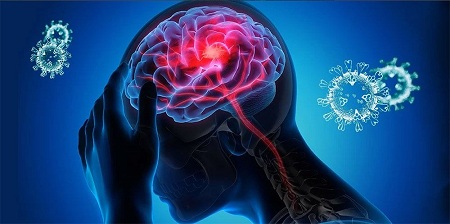LATEST! NEURO-COVID: New York University Led Study Reveals That COVID-19 Causes Neurological Damage in About 1 In 7 Patients
Source: NEURO-COVID Oct 19, 2020 5 years, 4 months, 1 week, 23 hours, 44 minutes ago
NEURO-COVID: A new study led by researchers from New York University Langone Health/NYU School of Medicine along with scientists from John Hopkins and University of Utah have found that about one in seven COVID-19 patients has potentially damaging neurological injuries.

It was found that these neurological injuries range from temporary confusion resulting from low body-oxygen levels to stroke and seizures in the more serious range. The research data however did not show signs of organ invasion by the SARS-CoV-2 virus; for example, cases of brain or nerve inflammation, such as meningitis or encephalitis. But the researchers warned that this should not be discounted as other studies are showing that it is occurring.
The observed neurological damage needs to be taken seriously because it significantly increases a patient’s risk of dying while still in the hospital, by 38%, the researchers warned.
The study findings was published in the journal Neurology
. https://n.neurology.org/content/early/2020/10/05/WNL.0000000000010979
Dr Jennifer Frontera, from the New York University Grossman School of Medicine, New York who is the study’s lead investigator told Thailand Medical News, “The results of our study showed no signs that the coronavirus directly attacks the nervous system. The neurological complications seen in COVID-19 are predominately the secondary effects of being severely ill and suffering from low oxygen levels in the body for prolonged periods of time.”
The research monitored 606 COVID-19 adult patients diagnosed with brain or other nerve-related conditions at four NYU Langone hospitals in New York City and Long Island between March 10 and May 20. In the hospitals, 4,491 patients tested positive for COVID-19 in that period. The findings showed that the common neurological problems, such as confusion caused by chemical electrolyte imbalances, severe infection or kidney failure, typically appeared within 48 hours of developing general COVID-19 symptoms, including fever, difficulty in breathing, and cough. Half of the patients with neurological symptoms were over the age of 81, which was significantly older than the other 3,885 patients with COVID-19 who did not experience neurological dysfunction. Of that group, the median age was 63.
The detailed results of the study are as follows: Of 4,491 COVID-19 patients hospitalized during the study timeframe, 606 (13.5%) developed a new neurologic disorder in a median of 2 days from COVID-19 symptom onset. The most common diagnoses were: toxic/metabolic encephalopathy (6.8%), seizure (1.6%), stroke (1.9%), and hypoxic/ischemic injury (1.4%). No patient had meningitis/encephalitis, or myelopathy/myelitis referable to SARS-CoV-2 infection and 18/18 CSF specimens were RT-PCR negative for SARS-CoV-2. Patients with neurologic disorders were more often older, male, white, hypertensive, diabetic, intubated, and had higher sequential organ failure assessment (SOFA) scores (all P<0.05). After adjusting for age, sex, SOFA-scores, intubation, past history, medical complications, medications and comfort-care-status, COVID-19 patients with neurologic disorders had increased risk of in-hospital mortality (Hazard Ratio[HR] 1.38, 95% CI 1.17-1.62, P<0.001) and decreased likelihood of discharge home (HR 0
.72, 95% CI 0.63-0.85, P<0.001).
In the cohort, COVID-19 patients with neurologic disorders had significantly higher risk of in-hospital mortality and lower rates of discharge home compared to COVID-19 patients without neurologic findings.
One strength of the study analysis was that the study team were able to adjust for a variety of other factors including comfort care status, which often confounds mortality analyses. In a separate study, we found that patients with laboratory confirmed COVID-19 and ischemic stroke have higher mortality rates than contemporary and historical ischemic stroke patients who did not have COVID-19. Others have found similar increases in mortality rates among patients with a spectrum of SARS-CoV-2 related neurologic diseases compared to contemporary COVID-19 negative neurologic patients. Additionally, the team studied neurological events as a time-dependent variable to avoid the “immortal time bias” which can occur when an event is observed more frequently in patients who survive long enough to be diagnosed. This methodology also allowed us to account for the duration of exposure to neurologic injury when predicting the hazard of in-hospital death.
There are limitations to this study that should be mentioned. First, patients with limited neurologic examinations due to sedation or paralysis may have had neurologic disorders that were undetected leading to underestimations in the prevalence of COVID-19 related neurological injury. Furthermore, neurology may not have been consulted on patients with mild neurologic symptoms.
For more on
NEURO-COVID, keep on logging to Thailand Medical News.
